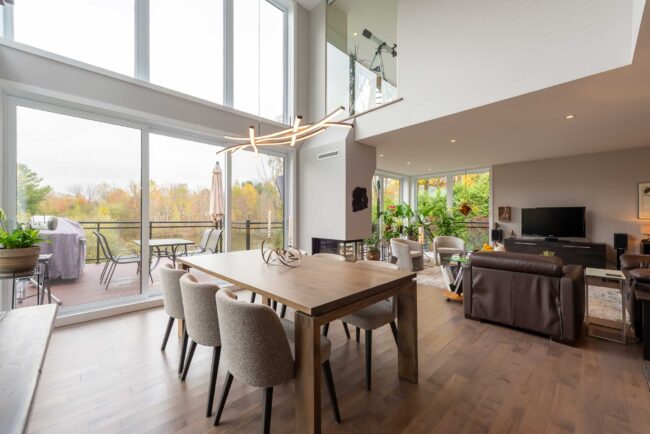Face à la construction d’une maison de prestige, l’une des questions majeures pour les clients est le choix du type de contrat adapté à leur projet. Entre les contrats à prix fixe, à coût majoré, ou de gestion de construction, chaque option présente ses spécificités. Le contrat à coût majoré émerge souvent comme le plus adapté pour les demeures de luxe, offrant une transparence financière et une flexibilité dans la gestion des imprévus, essentielles dans la réalisation de projets haut de gamme personnalisés. Cet article aborde les différentes formules contractuelles, en soulignant les avantages du contrat à coût majoré, afin de guider les futurs propriétaires dans leur décision cruciale, garantissant ainsi que la construction de leur résidence de prestige se déroule selon leurs aspirations et exigences uniques.
Les différents types de contrats de construction de maison de prestige

Lors de la planification d’une maison de prestige, comprendre les types de contrats disponibles est essentiel pour choisir l’approche qui correspond le mieux à vos besoins. Au Québec, il y a deux types de contrat principaux dans le domaine de la construction : le contrat à prix fixe et le contrat à coût majoré.
Qu’est-ce que la construction à prix fixe (contrat forfaitaire)?
La construction à prix fixe, ou contrat à prix fixe, est un accord où l’entreprise de construction s’engage à réaliser le projet pour un montant global prédéfini. Ce modèle offre une prévisibilité budgétaire, car le coût total du projet est déterminé à l’avance. Cependant, il offre moins de flexibilité pour les modifications en cours de projet et peut conduire à des compromis sur la qualité si des coûts imprévus surviennent, l’entrepreneur devant rester dans les limites du budget fixe.
-
Avantages : Budget clairement défini et risque financier limité pour le client.
-
Inconvénients : Moins de flexibilité pour apporter des modifications; peut entraîner des compromis sur la qualité si des coûts imprévus apparaissent, car l’entrepreneur pourrait réduire les dépenses pour maintenir sa marge
Inconvénients supplémentaires de la construction à prix fixe
En plus des limitations déjà mentionnées, la construction à prix fixe présente des défis spécifiques, particulièrement dans des régions comme les Cantons-de-l’Est et les Laurentides.
-
Incertitude de l’excavation : Dans ces zones, l’excavation peut révéler des formations rocheuses imprévues, rendant le coût de cette phase difficile à estimer précisément à l’avance. Si un contrat à prix fixe inclut l’excavation, l’entrepreneur peut intégrer une majoration considérable pour couvrir ces risques potentiels. Cette majoration peut significativement gonfler le budget global, car l’entrepreneur cherchera à se protéger contre les variations coûteuses dues à la nature imprévisible du sous-sol.
-
Modifications et ajouts : Un autre inconvénient majeur du contrat à prix fixe est la gestion des modifications ou des ajouts au projet initial. Toute modification ou amélioration par rapport au plan convenu entraînera des coûts supplémentaires. Ces frais additionnels sont souvent majorés car ils sont considérés comme des extras hors contrat, ce qui peut rendre les ajustements ou les améliorations beaucoup plus coûteux que prévu. Cette situation limite la flexibilité du propriétaire à apporter des changements et peut conduire à des coûts exorbitants pour des modifications parfois mineures.
Qu’est-ce que la construction à coût majoré?
La construction à coût majoré, ou contrat à coût majoré, est un type d’accord où le client s’engage à rembourser à l’entreprise de construction les coûts du projet plus un frais fixe ou un pourcentage couvrant le profit et les frais généraux. Ce modèle favorise la transparence, car le propriétaire peut voir exactement où chaque dollar est dépensé.
Flexibilité et adaptabilité
Les projets de maisons de luxe impliquent souvent des éléments complexes et sur mesure qui peuvent évoluer pendant le processus de construction. Le modèle à coût majoré permet une flexibilité, en accommodant les changements ou améliorations sans devoir renégocier le contrat ou modifier le prix fixe. Cette adaptabilité est essentielle pour garantir que la maison finie soit conforme à la vision et aux standards de luxe du propriétaire.
Intérêts alignés
Les contrats à coût majoré alignent les intérêts de l’entrepreneur et du propriétaire. Puisque le profit de l’entrepreneur est un pourcentage fixe des coûts réels, il y a un incitatif à travailler de manière efficace et transparente. Cette approche de partenariat favorise une relation collaborative axée sur l’atteinte du meilleur résultat possible pour le projet.
Assurance de la qualité et souci du détail
Les maisons de prestige exigent la plus haute qualité et une attention particulière aux détails. Sous un accord à coût majoré, les constructeurs sont plus enclins à se concentrer sur la qualité plutôt que de réduire les coûts pour rester dans les limites d’une offre fixe. Les propriétaires ont la liberté de sélectionner des matériaux et finitions de premier choix, assurant que la maison reflète leur niveau de luxe et d’artisanat souhaité.
Économies et transparence avec la construction à coût majoré
L’adoption du modèle à coût majoré permet une estimation véritable et honnête, sans rien de caché, ce qui tranche avec les pratiques d’autres secteurs où les opacités et les marges gonflées sont courantes. Cette méthode élimine le jeu souvent rencontré dans les négociations, où le coût proposé s’ajuste mystérieusement en fonction de la capacité financière perçue du client. Dans le monde de la construction à coût fixe, il n’est pas rare que les devis s’alignent de façon suspecte juste en dessous du maximum que le client est prêt à dépenser, une pratique qui soulève des questions sur la sincérité des évaluations.
Avec la construction à coût majoré, en revanche, chaque dépense est justifiée et documentée, écartant toute spéculation sur le gonflement des coûts. Les clients peuvent ainsi voir exactement où et comment leur argent est investi, garantissant que le projet se déroule avec une transparence financière totale. Cette ouverture permet non seulement de bâtir une relation de confiance entre le client et l’entrepreneur mais assure également que le budget est utilisé de la manière la plus efficace et économique possible, sans surprises désagréables liées à des estimations manipulées.
La méthode utilisée par les professionnels pour leurs projets personnels
L’approche à coût majoré peut souvent mener à des économies substantielles, ce qui explique pourquoi elle est privilégiée par les professionnels de la construction pour leurs propres projets. Dans un devis traditionnel à coût fixe, les sous-traitants et les entrepreneurs incluent généralement un pourcentage de « contingence » pour se prémunir contre les dépassements de coûts imprévus. L’entrepreneur général, recevant ces estimations, applique souvent une marge supplémentaire de sécurité sur le budget total, ce qui peut entraîner une accumulation significative de contingences.
En revanche, dans un modèle à coût majoré, si la contingence est utilisée, elle l’est de manière transparente et uniquement pour des besoins réels, évitant ainsi une surcharge systématique. Cette méthode garantit que le client ne paie que pour les coûts effectivement encourus. Dans la majorité des cas, les fonds alloués à la contingence sont partiellement ou totalement économisés, car tous les coûts sont directement liés aux dépenses réelles du projet. Ainsi, à moins que les imprévus ne se matérialisent, le client bénéficie d’une économie considérable par rapport au modèle à coût fixe, où la contingence est souvent entièrement consommée ou même dépassée.
La construction à coût majoré chez Construction Memphré

Chez Construction Memphré, nous adoptons une approche transparente et centrée sur le client pour la construction à coût majoré. Notre processus est conçu pour maintenir une communication claire et constante, assurant que vous restez informé et en contrôle de votre projet de maison de prestige du début à la fin. En plus des nombreux avantages déjà énumérés pour ce qui est des contrats à coûts majorés, voici quelques avantages qui sont propres à Construction Memphré.
-
Mises à jour mensuelles : Nous fournissons des rapports mensuels détaillés pour montrer l’évolution du budget, assurant une transparence complète et permettant aux clients de suivre le progrès financier de leur projet.
-
Transparence des dépenses : Toutes les factures et dépenses sont partagées avec les clients, avec les numéros de commande correspondants, assurant une allocation précise dans le budget du projet.
-
Redistribution des rabais : Nous passons directement aux clients tous les rabais obtenus auprès des fournisseurs et sous-traitants, contrairement à la norme du secteur au Québec, pour optimiser l’économie sur le coût total du projet.
Conclusion
En conclusion, choisir le bon contrat pour la construction de votre maison de prestige est un élément décisif qui influence l’ensemble du projet. Le modèle à coût majoré se distingue comme une option privilégiée pour les constructions de prestige, grâce à sa transparence, sa flexibilité et son alignement sur les besoins uniques du client. Ce type de contrat facilite une collaboration étroite entre le client et l’entrepreneur, garantissant que la vision de luxe est réalisée sans compromis. Chez Construction Memphré, nous sommes fiers d’offrir ce modèle, mettant en avant une gestion financière claire, une communication constante et un partage des économies réalisées, assurant ainsi que chaque projet reflète l’excellence et le raffinement recherchés par nos clients. Opter pour un contrat à coût majoré avec Construction Memphré, c’est choisir un partenariat fondé sur la confiance, l’expertise et un engagement partagé envers la qualité et la satisfaction.




